Yasmin Omar considers the similarities between the British actress’ upper-class characters in Saltburn and An Education, from their small-minded pursuits to their feigned politesse.

This article contains Saltburn spoilers.
In the now iconic monologue of 2014’s Gone Girl, Rosamund Pike, as vindictive psychopath Amy Dunne, outlines the key characteristics of the Cool Girl: ‘Cool Girl is hot. Cool Girl is game. Cool Girl is fun. Cool Girl never gets angry at her man.’ Well before her Cool Girl days, though, Rosamund Pike was one of British screen acting’s preeminent Posh Girls. In adaptations of Jane Austen, DH Lawrence, Nancy Mitford, she swans around looking expensive in perfectly pressed gowns and coiffed hair, a willowy blonde speaking Queen’s English as spotless as a china tea set polished by a scullery maid.
Pike’s latest role, as Lady Elspeth Catton in Emerald Fennell’s psychosexual thriller Saltburn (2023), lands her right back in the familiar playground that is the English country house (indeed the film is named after its centuries-old estate). In the movie, Elspeth has shoved a silver spoon far enough down the throat of her son Felix (Jacob Elordi) that it’s tickling his tonsils – and turning him into an irredeemable snob. That doesn’t stop him becoming the object of covetous, homoerotic fixation for his working-class Liverpudlian friend Oliver (Barry Keoghan), who joins Felix and family at Saltburn for the summer holidays.
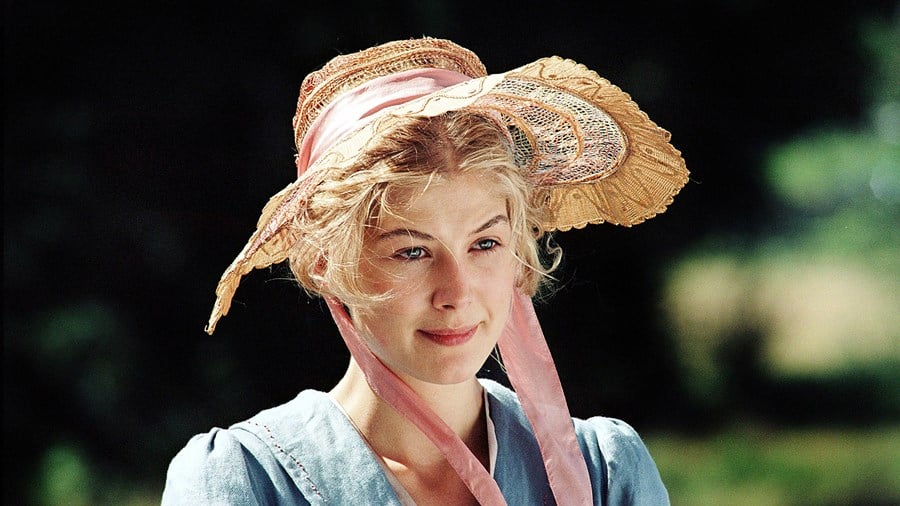
Pride & Prejudice (2005)
Fennell’s film is not a million miles away from Lone Scherfig’s coming-of-age drama An Education (2009), in which Carey Mulligan’s academic 16-year-old Jenny abandons her studies when she is seduced by Peter Sarsgaard’s urbane older man, David. Both films are period pieces centred on leads who have strived/are striving to study English at Oxford University, are hypnotised by the material pleasures of the upper class and try to assimilate into their ranks. The movies’ most important overlap, for our purposes, is their expert deployment of Rosamund Pike, who serves as a symbol of the glamorous, affluent world these younger characters yearn to inhabit. The two women Pike plays have different temperaments: the actress brings haughty severity to Saltburn’s distant matriarch Elspeth and gormless comedy to An Education’s ditsy socialite Helen. And yet, as Posh Girls, they represent the same value system, founded on the principle of preserving their own social capital by reminding their underlings that they are superior to them.
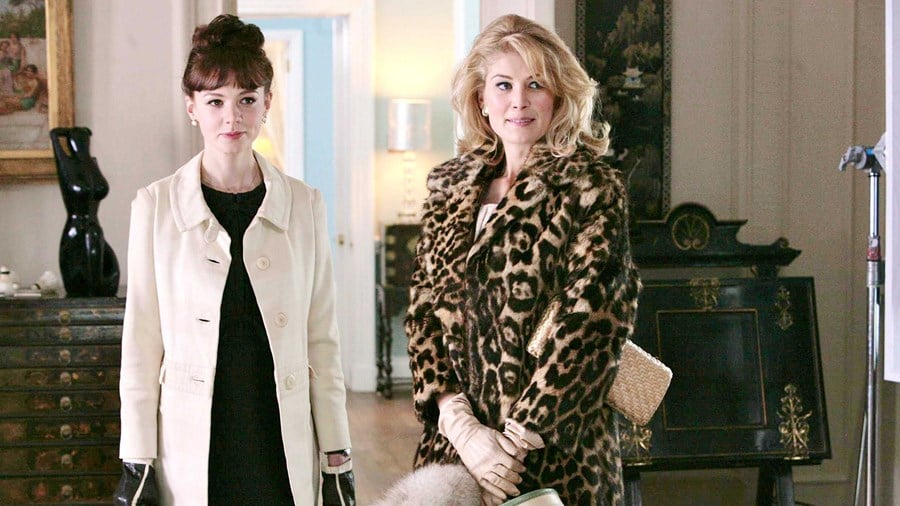
An Education (2009)
This is apparent as soon as Elspeth is introduced in Saltburn. After his first night staying in the Cattons’ palatial mansion, scholarship kid Oliver gingerly makes his way down to breakfast – passing oil paintings of Felix’s ‘dead rellies’ and sheets that ‘still have some of Henry VIII’s spunk on’ – when he overhears his hosts gossiping about him and stops at the doorway to listen in. Elspeth is in her purest form here: she isn’t putting on airs in front of her inner circle, this is what she really thinks. And what she really thinks, as is often the case, reveals more about her than Oliver. She berates him – his clinginess towards her son, his impoverished upbringing, his alcoholic mother – with such a casual, lethargic disdain that’s all the more damning because Pike’s cold aloofness shows her character clearly doesn’t care.
Elspeth’s class prejudice is evident when she asks where Liverpool is (tacitly saying if it’s not in the home counties it’s of no significance), then concludes that ‘they probably don’t have rehab’ there. She may be better travelled than Oliver, but she is deeply unworldly. Saltburn is her world, and she knows very little about what goes on outside it. When her guest finally enters the room, and the assembled family realises Oliver has heard everything they said, Elspeth’s demeanour entirely changes. She softens, feigns sympathy for the plights we just witnessed her belittle, and rushes over to the teenager to paw at his face and tell him he’s handsome. Fennell’s script exposes the false veneer of friendliness that animates the Posh Girl: it’s all air-kisses to your face and sharp words behind your back. Elspeth knows Oliver has been made aware of her true feelings, but continues with her charade regardless. Keeping up appearances is all that matters.
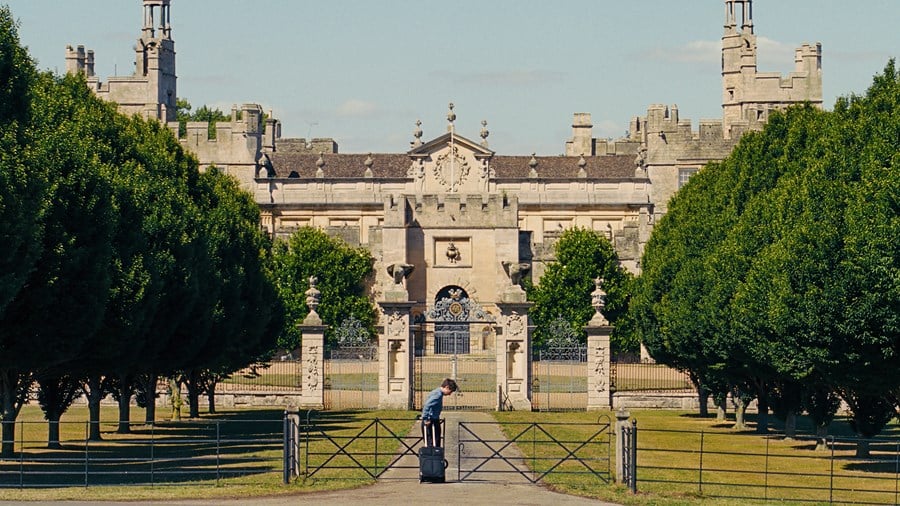
Saltburn (2023)
Helen’s behaviour in An Education is certainly less calculated. She is a beautiful halfwit who uncritically repeats the last thing she heard, even if it’s the ludicrous notion that Latin isn’t a dead language. However, like Elspeth, she lies to smooth over awkwardness, which only widens the class chasm between her and Jenny. During her first scene, at a Ravel recital in Saint John’s Smith Square, Jenny is overcome by the elegance of Helen’s gleaming white fur stole, and strokes it. The schoolgirl has never seen such luxury. Helen apathetically tells her it’s from ‘Chelsea somewhere’ – money is no object, west-London boutiques all blur into one – then strains to find something nice to say about Jenny’s beaten-up polyester number. ‘Yours is… well…’ she stammers, ‘good for this sort of concert, isn’t it?’
On the face of it, this statement is innocent enough. Helen’s sparing Jenny’s feelings by acting as if their coats are comparable. But, as the film goes on, her friendliness is revealed to be a façade that keeps Jenny at a remove from the group, a quartet that also comprises David, and Helen’s boyfriend Danny (Dominic Cooper). Despite holding a welcoming hand out to Jenny, walking arm-in-arm with her, gifting her a dress, Helen is always concealing the fact that David is married. Jenny and David’s relationship is a sham. By supporting her friend’s dalliance with an A-level student, Helen helps facilitate Jenny’s future heartbreak, so avoiding hurt feelings at the concert is inconsequential when compared with the teenager’s later wave of pain. Helen turns a blind eye to David’s adultery to ringfence her own comforts: spending money, dog racing, white-brick townhouses. Posh Girls protect their own – and themselves.
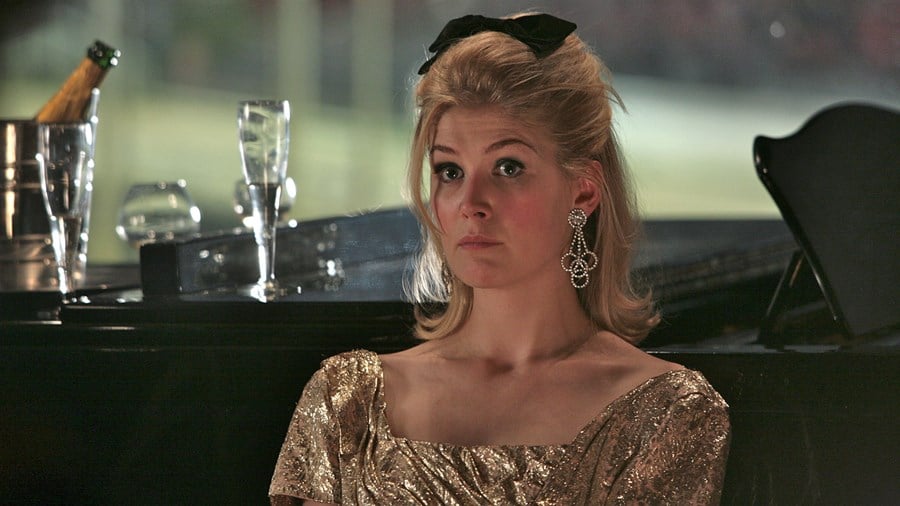
An Education (2009)
A further commonality between Helen and Elspeth is their vapid admiration of beauty above all else. In the aforementioned Saltburn scene, when the lady of the house is fawning over Oliver’s good looks, she states that she has ‘a complete and utter horror of ugliness’. What a thing to say! Felix, to his credit, does chide her for her shallowness. It’s the ‘horror’ that’s hard to wrap your head around: what does Elspeth believe the ugly will do to her? Once again, she’s identified an Other to exist in opposition to her, establishing another hierarchy that she can preside over (where it was previously social standing, now it’s attractiveness). In fact, the first thing we learn about Elspeth, even before her initial appearance, is her rigid adherence to arbitrary aesthetic rules. Felix informs Oliver he must shave ahead of meeting his mother because she has ‘a phobia of beards and stubble’. She controls how the men around her style their facial hair. They must conform to her beauty standards. These two sequences are emblematic of how Elspeth cares deeply about surface, at the expense of real issues.
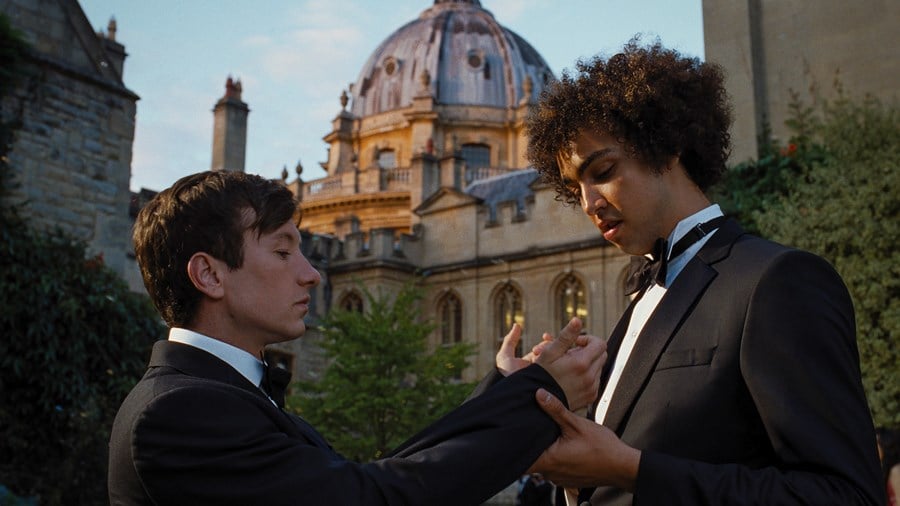
Saltburn (2023)
Helen is much the same. It’s no accident that her longest speech in An Education, which Pike delivers with an airy thoughtlessness, criticises the appearances of female Oxford students. ‘Why are university girls so strange-looking?’ she muses, perplexed. ‘They can’t all have started off that way, can they? I mean, most girls aren’t born ugly but most girl students seem to be, so there must be something about these places that makes you fat or spotty or short-sighted.’ Helen judges these young women for how they look, and narrow-mindedly blames education for their deviation from conventional beauty ideals. Her literal shuddering at the mere idea of doing an undergraduate degree therefore demonstrates that, according to her own specious binary, she’d rather be beautiful and brainless than ugly and intelligent. (When Jenny drops out of school, Helen is overjoyed: ‘I knew you’d see sense about university! You can stay pretty now.’)
Throughout the film, she is relentlessly anti-academia, looking down on anything that would expand her horizons, unsurprising from someone who thinks you ‘learn more’ from magazines than books. At the Ravel concert, Scherfig’s camera pans over our core four, taking stock of their expressions. Jenny’s enraptured, David and Danny are appreciative… and Helen is struggling to stay awake, her eyes are closed and there’s a stubborn grimace in her chin. Later that evening, at a jazz club, the conversation turns to the Pre-Raphaelites and, while everyone else sings the praises of Burne-Jones, Helen looks on blankly, visibly bored. A few days later, at a Christie’s auction, Helen excuses herself from the proceedings to coo over a dog. A Posh Girl doesn’t need to be smart or ambitious or curious; all of her material desires are catered to.
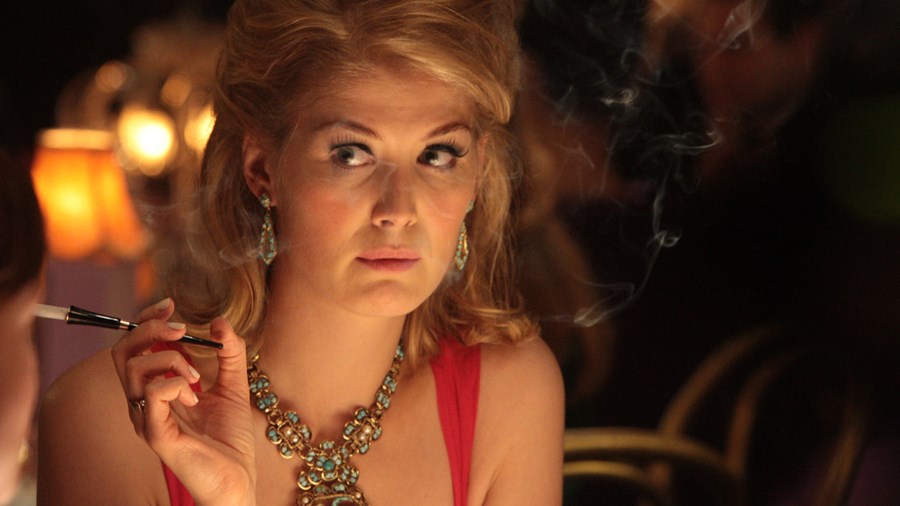
An Education (2009)
Where Helen is unwilling to learn, Elspeth is unwilling to engage with anything difficult. When her nephew Farleigh (Archie Madekwe) is suspected of stealing family valuables, Oliver is concerned that Elspeth will want to talk about it. Felix, knowing her and her foibles, is convinced that she won’t bring it up. And she doesn’t. She sinks into a wicker chair next to the boys and begins nattering about her own past: her modelling days, her acquaintances with Oasis and Blur, the widely believed rumour that Pulp’s 1995 hit ‘Common People’ was about her. At one point, during this self-absorbed stream of consciousness, she mentions the funeral of her friend Pamela (also, incidentally, played by Mulligan), who was alive and well as far as we knew. Oliver seems slightly rattled by her death, but Elspeth is cutting. ‘She’d do anything for attention,’ she sniffs. It’s a pretty atrocious thing to say about anyone’s demise, not least someone you called a friend and who lodged with you for months.

Saltburn (2023)
A callous disregard for the deceased isn’t just applicable to Elspeth’s social circle, mind you. The untimely death of her son inspires a broadly similar reaction. She sees his corpse on the ground then loudly declares, ‘It’s nearly lunch!’ There’s stiff upper lip and then there’s Elspeth. She exhibits the kind of tamping-down of natural emotion that only comes with generations of British breeding. During the meal, she clings to a show-must-go-on mentality while the coroner carries away Felix’s lifeless body – within eye- and earshot. As with her idle chatter about the Nineties music scene, she maintains a steady flow of irrelevant conversation, blathering on about how beautiful (that again) the house looks and that cold hands make good chocolate cakes.
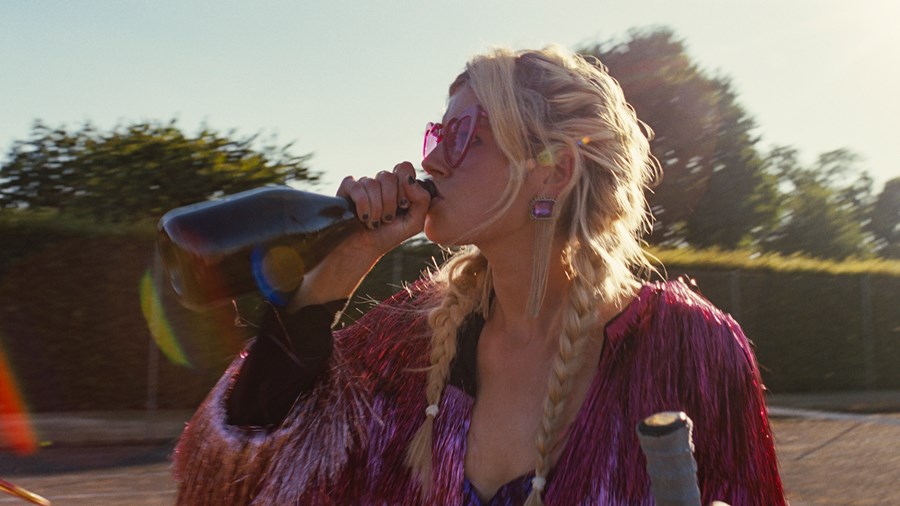
Saltburn (2023)
The key difference between this scene and the former is that Pike hints at the feeling roiling beneath the character here where she didn’t before. There’s a slightly nauseous sheen to her complexion, a quiver in her voice, yet she carries on talking and talking. Farleigh, screaming and tearful, asks why Elspeth is acting as if nothing has happened. She stoically, wearily replies, ‘What else is there to do, darling?’ In Saltburn and An Education, Rosamund Pike’s Posh Girls are haughty, insipid, materialistic and, crucially, more than able to disconnect themselves from real emotion. These films show the monetary wealthy to be spiritually poor. They own nice things, sure, but who would want to live in a world where cultivating appearances is the primary goal?
WATCH SALTBURN IN CINEMAS




